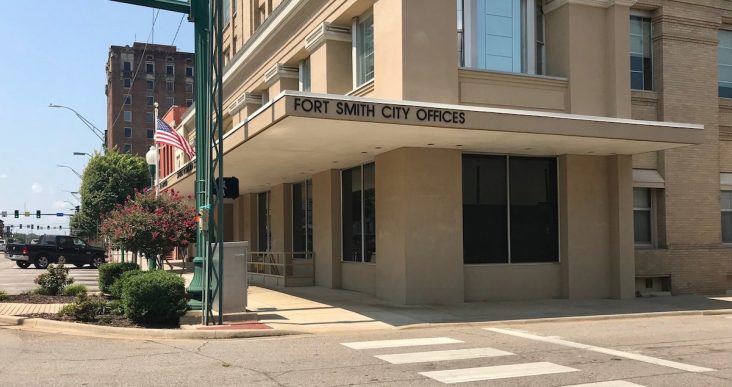Fort Smith Board approves CNG fueling station, plans for conversion of sanitation trucks
by April 20, 2021 7:53 pm 1,517 views

The Fort Smith Board of Directors approved an ordinance Tuesday night (April 20) that removes the city from the responsibility of setting taxicab rates, along with a resolution to build a CNG (compressed natural gas) fueling station at the Fort Smith Sanitary Landfill.
The taxi ordinance keeps all other regulations and requirements for operating taxicabs in the city. The ordinance passed five to two with Directors Lavon Morton and Robyn Dawson voting against the ordinance.
“City government should never set a private company’s fare or rate. Rates should be left up to the fair market of a city or the United States,” said Director Kevin Settle.
The ordinance removes the instructions in the municipal code concerning the set rates of taxicabs and amends code to state that, each operator and driver must post in the car a copy of any applicable zone map, if used, in a size of at least 14 inches by 20 inches and a copy of the current fares to be charged. Signs should be posted in the interior portion of the vehicle in print easily legible to a passenger. A sign also must be posted that gives the driver’s name, photograph and taxicab number.
The directors approved resolutions to enter into contracts with Clean Energy of California, Inc. out of north Texas for the construction of a CNG fueling station at the landfill and to renovate the sanitation maintenance facility to CNG compliance. The construction of the fueling station will cost about $1.8 million, and the renovations will be $373,280, said Kyle Foreman, director of solid waste services. The station will have 50 slow fill stations and one fast fill station that can be used for other city vehicles that are converted to CNG.
“One of the goals of the Future Fort Smith Comprehensive Plan is to improve air quality in the city and increase CNG use where deemed appropriate. The city’s transit department built its CNG fueling station in 2019. … It’s time for solid waste to make the conversion,” Foreman said.
Solid Waste has the largest amount of heavy diesel fueled equipment in the city, Foreman said. When Foreman budgeted for the station, he budgeted $2.5 million. The project will come in roughly $300,000 under budget and will allow for “hundreds of thousands in savings each year” in the form of fuel and maintenance, Foreman said.
Conservatively, the trash hauling vehicles use 131,000 gallons of diesel fuel each year. Foreman mentioned the last price they received on diesel fuel was $2.30. The last time he checked the AOG CNG station near the Fort Smith Regional Airport, the price was $1 per equivalent gallon, he added. That equals about $170,000 savings on fuel annually, he said.
“Twenty-five to 30% of our maintenance cost and down time is directly related to diesel emissions equipment,” Foreman said. “Last year, we spent about $970,000 – to $1 million on hauling maintenance.”
That means the department will have $250,000 to $300,000 on maintenance cost, he said.
The project will require the sanitation department to complete a fleet conversion to CNG-powered trucks. Foreman, with the help of Clean Energy, applied for $1.604 million grant from the Environmental Protection Agency (EPA) grant through the Diesel Emissions Reeducation Act, which will allow the city to replace 14 garbage trucks in 2022 and will convert the rest of the fleet either by attrition or realizing other clean energy grants over the next five years, Foreman said. The EPA grant has a mandatory cost share of $3 million to the city, and the diesel trucks replaced will have to be scrapped.
The department will not learn until May if they receive the grant. If the city does not receive the grant, the sanitation department will not be able to replace 14 trucks in 2022 and will have to restructure the timeline for replacing trucks, Foreman said.
“This project will result in a decrease of 1,415 metric tons of CO2 annually, which is the equivalent of taking 306 cars off the road each year,” Foreman said.
Part of Foreman’s plan is to have the fleet powered by the methane gas that is naturally produced at the landfill. This gas is now being captured, cleaned and introduced in an AOG transmission line that feeds their CNG station. Foreman hopes to renegotiate the contract that allows for the transmission of the gas, as well as work with Fort Smith Public Schools to have a design competition with students that will promote “Trash Today, Fuel Tomorrow,” he said.
